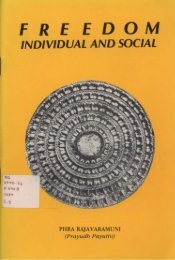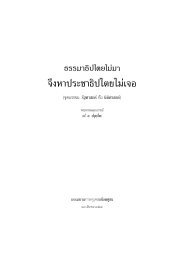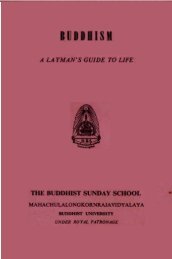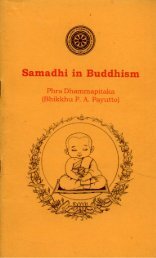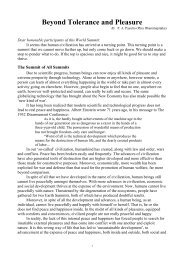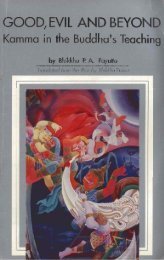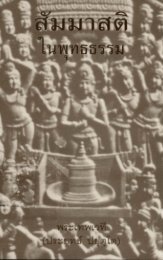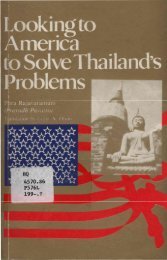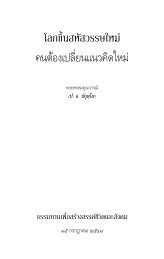e
You also want an ePaper? Increase the reach of your titles
YUMPU automatically turns print PDFs into web optimized ePapers that Google loves.
Chanting Book<br />
Pali / English<br />
e<br />
BUDDHANET'S<br />
BOOK LIBRARY<br />
E-mail: bdea@buddhanet.net<br />
Web site: www.buddhanet.net<br />
Buddha Dharma Education Association Inc.
Chanting Book<br />
Morning and Evening Chanting<br />
Protection Discourses
Contents<br />
Morning Chanting<br />
Anekajāti Gāthā . .. .. .. .. .. .. .. .. .. .. .. .. .. .. .. .. .. .. .. .. .. .. .. .. .. .. .. .. .. .. .. .. .. .. .. .. .. .. .. .. .. .. .. .. .. .. .. .. .. .. .. .. .. .. .. .. .. .. .. .. . 3<br />
Through Many Births . .. .. .. .. .. .. .. .. .. .. .. .. .. .. .. .. .. .. .. .. .. .. .. .. .. .. .. .. .. .. .. .. .. .. .. .. .. .. .. .. .. .. .. .. .. .. .. .. .. .. .. .. .. . 3<br />
Pațiccasamuppāda . .. .. .. .. .. .. .. .. .. .. .. .. .. .. .. .. .. .. .. .. .. .. .. .. .. .. .. .. .. .. .. .. .. .. .. .. .. .. .. .. .. .. .. .. .. .. .. .. .. .. .. .. .. .. .. .. .. . 4<br />
Paṭṭhānapaccayuddesa . .. .. .. .. .. .. .. .. .. .. .. .. .. .. .. .. .. .. .. .. .. .. .. .. .. .. .. .. .. .. .. .. .. .. .. .. .. .. .. .. .. .. .. .. .. .. .. .. .. .. .. . 6<br />
Pabbajita Abhiṇhasutta . .. .. .. .. .. .. .. .. .. .. .. .. .. .. .. .. .. .. .. .. .. .. .. .. .. .. .. .. .. .. .. .. .. .. .. .. .. .. .. .. .. .. .. .. .. .. .. .. .. .. .. . 6<br />
Metta Bhāvanā . .. .. .. .. .. .. .. .. .. .. .. .. .. .. .. .. .. .. .. .. .. .. .. .. .. .. .. .. .. .. .. .. .. .. .. .. .. .. .. .. .. .. .. .. .. .. .. .. .. .. .. .. .. .. .. .. .. .. .. .. .. . 8<br />
Evening Chanting<br />
Metta Bhāvanā . .. .. .. .. .. .. .. .. .. .. .. .. .. .. .. .. .. .. .. .. .. .. .. .. .. .. .. .. .. .. .. .. .. .. .. .. .. .. .. .. .. .. .. .. .. .. .. .. .. .. .. .. .. .. .. .. .. .. .. .. . 14<br />
Paritta Suttas<br />
Maṅgala Sutta . .. .. .. .. .. .. .. .. .. .. .. .. .. .. .. .. .. .. .. .. .. .. .. .. .. .. .. .. .. .. .. .. .. .. .. .. .. .. .. .. .. .. .. .. .. .. .. .. .. .. .. .. .. .. .. .. .. .. .. .. .. .. . 15<br />
Ratana Sutta . .. .. .. .. .. .. .. .. .. .. .. .. .. .. .. .. .. .. .. .. .. .. .. .. .. .. .. .. .. .. .. .. .. .. .. .. .. .. .. .. .. .. .. .. .. .. .. .. .. .. .. .. .. .. .. .. .. .. .. .. .. .. .. .. . 16<br />
Metta Sutta . .. .. .. .. .. .. .. .. .. .. .. .. .. .. .. .. .. .. .. .. .. .. .. .. .. .. .. .. .. .. .. .. .. .. .. .. .. .. .. .. .. .. .. .. .. .. .. .. .. .. .. .. .. .. .. .. .. .. .. .. .. .. .. .. .. . 18<br />
Morning Chanting<br />
Anekajāti Gāthā<br />
Anekajāti saṃsāraṃ, sandhāvissaṃ anibbisaṃ;<br />
Gahakāraṃ gavesanto, dukkhā jāti punappunaṃ.<br />
Gahakāraka diṭṭhosi, puna gehaṃ na kāhasi;<br />
Sabbā te phāsukā bhaggā, gahakūṭaṃ visaṅkhataṃ;<br />
Visaṅkhāra gataṃ cittaṃ, taṇhānaṃ khayamajjhagā.<br />
Through Many Births<br />
Through many births I wandered in saṃsāra; seeking, but not finding<br />
The builder of this house, painful is repeated existence!<br />
Householder! you are seen now, you shall build no house again.<br />
Your rafters are broken! Your ridge-pole is shattered.<br />
To dissolution goes my mind. Achieved is the destruction of craving.<br />
3
Paṭiccasamuppāda<br />
Avijjā-paccayā saṅkhārā, saṅkhāra-paccayā viññāṇaṃ, viññāṇa-paccayā<br />
nāma-rūpaṃ, nāma-rūpa-paccayā saḷāyatanaṃ, saḷāyatana-paccayā<br />
phasso, phassa-paccayā vedanā, vedanā-paccayā taṇhā, taṇhā-paccayā<br />
upādānaṃ, upādāna-paccayā bhavo, bhava-paccayā jāti, jāti-paccayā<br />
jarā-maraṇaṃ soka-parideva-dukkha-domanassupāyāsā sambhavanti:<br />
evametassa kevalassa dukkhakkhandhassa samudayo hotī ’ti.<br />
Yadā have pātubhavanti dhammā,<br />
ātāpino jhāyato brāmhaṇassa;<br />
Athassa kaṅkhā vapayanti sabbā,<br />
yato pajānāti sahetu dhammaṃ.<br />
Avijjāya tveva asesa-virāga-nirodhā<br />
saṅkhāra-nirodho, saṅkhāra-nirodhā<br />
viññāṇa-nirodho, viññāṇa nirodhā<br />
nāma-rūpa-nirodho, nāma-rupā-nirodhā<br />
saḷāyatana-nirodho, saḷāyatana-nirodhā<br />
phassa-nirodho, phassa-nirodhā<br />
vedanā-nirodho, vedanā-nirodhā<br />
taṇhā-nirodho, taṇha-nirodhā upādānanirodho,<br />
upādāna-nirodhā bhavanirodho,<br />
bhava-nirodha jāti-nirodho,<br />
jāti-nirodha jarā-maraṇaṃ sokaparideva-dukkha-domanassupāyāsā<br />
nirujjhanti: evametassa kevalassa<br />
dukkhakkhandhassa nirodho hotī ’ti.<br />
Yadā have pātubhavanti dhammā,<br />
ātāpino jhāyato brāmhaṇassa;<br />
Athassa kaṅkhā vapayanti sabbā,<br />
yato khayaṃ paccayānaṃ avedi.<br />
Avijjā-paccayā saṅkhārā, saṅkhāra-paccayā viññāṇaṃ, viññāṇapaccayā<br />
nāma-rūpaṃ, nāma-rūpa-paccayā saḷāyatanaṃ, saḷāyatanapaccayā<br />
phasso, phassa-paccayā vedanā, vedanā-paccayā taṇhā, taṇhāpaccayā<br />
upādānaṃ, upādāna-paccayā bhavo, bhava-paccayā jāti,<br />
jāti-paccayā jarā-maraṇaṃ soka-parideva-dukkha-domanassupāyāsā<br />
sambhavanti: evametassa kevalassa dukkhakkhandhassa samudayo<br />
hotī ’ti.<br />
4
Dependent Origination<br />
Conditioned by ignorance, intentional activities arise; conditioned by<br />
intentional activities, re-linking consciousness arises; conditioned by relinking<br />
consciousness, mind and matter arise; conditioned by mind and<br />
matter, the six-fold base arises; conditioned by the sixfold base, contact<br />
arises; conditioned by contact, feeling arises; conditioned by feeling,<br />
craving arises; conditioned by craving, grasping arises; conditioned<br />
by grasping, becoming arises; conditioned by becoming, birth arises;<br />
conditioned by birth, ageing, death, sorrow, lamentation, pain, grief,<br />
and despair arise. Thus does this entire mass of suffering arise.<br />
Truly, when things grow plain<br />
To the ardent meditating recluse,<br />
His doubts all vanish<br />
In that he comprehends things with cause.<br />
With the entire cessation of this ignorance, intentional activities cease;<br />
with the cessation of intentional activities, re-linking consciousness<br />
ceases;… re-linking consciousness, mind and matter cease;… mind<br />
and matter, the sixfold base ceases;… the sixfold base, contact<br />
ceases;… contact, feeling ceases;… feeling, craving ceases;… craving,<br />
grasping ceases;… grasping, becoming ceases;… becoming, birth<br />
ceases; with the cessation of birth; ageing, death, sorrow, lamentation,<br />
pain, grief and despair cease. Thus does this entire mass of suffering<br />
cease.<br />
Truly, when things grow plain<br />
To the ardent meditating recluse,<br />
His doubts all vanish<br />
In that he discerns the destruction of cause.<br />
Conditioned by ignorance, intentional activities arise; conditioned by<br />
intentional activities, re-linking consciousness arises; conditioned by relinking<br />
consciousness, mind and matter arise; conditioned by mind and<br />
matter, the six-fold base arises; conditioned by the sixfold base, contact<br />
arises; conditioned by contact, feeling arises; conditioned by feeling,<br />
craving arises; conditioned by craving, grasping arises; conditioned<br />
by grasping, becoming arises; conditioned by becoming, birth arises;<br />
conditioned by birth, ageing, death, sorrow, lamentation, pain, grief,<br />
and despair arise. Thus does this entire mass of suffering arise.<br />
5
Avijjāya tveva asesa-virāga-nirodhā saṅkhāra-nirodho, saṅkhāranirodhā<br />
viññāṇa-nirodho, viññāṇa nirodhā nāma-rūpa-nirodho,<br />
nāma-rupā-nirodhā saḷāyatana-nirodho, saḷāyatana-nirodhā phassanirodho,<br />
phassa-nirodhā vedanā-nirodho, vedanā-nirodhā taṇhānirodho,<br />
taṇha-nirodhā upādāna-nirodho, upādāna-nirodhā bhavanirodho,<br />
bhava-nirodha jāti-nirodho, jāti-nirodha jarā-maraṇaṃ sokaparideva-dukkha-domanassupāyāsā<br />
nirujjhanti: evametassa kevalassa<br />
dukkhakkhandhassa nirodho hotī ’ti.<br />
Yadā have pātubhavanti dhammā,<br />
ātāpino jhāyato brāmhaṇassa;<br />
Vidhū-payaṃ tiṭṭhati mārasenaṃ,<br />
sūriyova obhāsaya mantalikkhaṃ.<br />
Paṭṭhānapaccayuddesa<br />
Hetu-paccayo, ārammaṇa-paccayo,<br />
adhipati-paccayo, anantara-paccayo,<br />
samanantara-paccayo, sahajāta-paccayo,<br />
aññamañña-paccayo, nissaya-paccayo,<br />
upanissaya-paccayo, purejāta-paccayo,<br />
pacchājāta-paccayo, āsevana-paccayo,<br />
kamma-paccayo, vipāka-paccayo,<br />
āhāra-paccayo, indriya-paccayo,<br />
jhāna-paccayo, magga-paccayo,<br />
sampayutta-paccayo, vippayutta-paccayo,<br />
atthi-paccayo, natthi-paccayo,<br />
vigata-paccayo, avigata-paccayo ’ti.<br />
Pabbajita Abhiṇhasutta<br />
Dasayime bhikkhave dhammā pabbajitena abhiṇhaṃ paccavekkhitabbā.<br />
Katame dasa? “Vevaṇṇiyamhi ajjhupagato”ti pabbajitena abhiṇhaṃ<br />
paccavekkhitabbaṃ. “Parapaṭibaddhāme jīvikā”ti pabbajitena<br />
abhiṇhaṃ paccavekkhitabbaṃ. “Añño me ākappo karaṇiyo”ti<br />
pabbajitena abhiṇhaṃ paccavekkhitabbaṃ. “Kacci nu kho me attā<br />
sīlato na upavadatī”ti pabbajitena abhiṇhaṃ paccavekkhitabbaṃ.<br />
“Kacci nu kho maṃ anuvicca viññū sabrahmacāri sīlato na upavadantī”ti<br />
pabbajitena abhiṇhaṃ paccavekkhitabbaṃ. “Sabbehi me<br />
piyehi manāpehi nānābhāvo vinābhāvo”ti pabbajitena abhiṇhaṃ<br />
6
With the entire cessation of this ignorance, intentional activities<br />
cease; with the cessation of intentional activities, re-linking consciousness<br />
ceases;… re-linking consciousness, mind and matter cease;… mind<br />
and matter, the sixfold base ceases;… the sixfold base, contact ceases;…<br />
contact, feeling ceases;… feeling, craving ceases;… craving, grasping<br />
ceases;… grasping, becoming ceases;… becoming, birth ceases; with<br />
the cessation of birth; ageing, death, sorrow, lamentation, pain, grief<br />
and despair cease. Thus does this entire mass of suffering cease.<br />
Truly, when things grow plain<br />
to the ardent meditating recluse<br />
Routing the host of Māra does he stand<br />
Like the sun when lighting up the sky.<br />
Conditional Relations<br />
Root condition, object condition,<br />
predominance condition, proximity condition,<br />
contiguity condition, conascence condition,<br />
mutuality condition, dependence condition,<br />
strong-dependence condition, prenascent condition,<br />
postnascence condition, repetition condition,<br />
kamma condition, resultant condition,<br />
nutriment condition, faculty condition,<br />
absorption condition, path condition,<br />
association condition, dissociation condition,<br />
presence condition, absence condition,<br />
disappearance condition, non-disappearance condition.<br />
Reflections for One Gone Forth<br />
These ten things, monks, should be constantly reflected upon by one<br />
gone forth. “My status has changed” should be reflected on constantly by<br />
one gone forth. “My very life depends on the gifts of others” should be reflected<br />
upon constantly by one gone forth. “I should behave differently to<br />
others” should be reflected on constantly by one gone forth. “Do I blame<br />
myself for any moral lapses?” should be reflected on constantly by one<br />
gone forth. “Do my wise fellow monks blame me for moral lapses?” should<br />
be reflected on constantly by one gone forth. “All that is pleasing to me<br />
will decay and disappear” should be reflected on constantly by one gone<br />
7
paccavekkhitabbaṃ. “Kammassakomhi kammadāyādo kammayoni<br />
kammabandhu kammappaṭisaraṇo, yaṃ kammaṃ karissāmi kalyāṇaṃ<br />
vā pāpakaṃ vā, tassa dāyādo bhavissāmī”ti pabbajitena abhiṇhaṃ<br />
paccavekkhitabbaṃ. “Kataṃ bhūtassa me rattindivā vītivattantī”ti<br />
pabbajitena abhiṇhaṃ paccavekkhitabbaṃ. “Kacci nu kho ahaṃ<br />
suññāgāre abhiramāmī”ti pabbajitena abhiṇhaṃ paccavekkhitabbaṃ.<br />
“Atthi nu kho me uttarimanussadhammo alamariyañāṇadassanaviseso<br />
adhigato, yohaṃ pacchime kāle sabrahmacāriyīhi puṭṭho na maṅku<br />
bhavissāmī”ti pabbajitena abhiṇhaṃ paccavekkhitabbaṃ.<br />
Ime kho bhikkhave dasa dhammā pabbajitena abhiṇhaṃ paccavekkhitabbāti.<br />
Metta Bhāvanā<br />
Ahaṃ avero homi, abyāpajjo homi, anīgho homi, sukhī attānaṃ<br />
pariharāmi, dukkhā muccāmi, yathā-laddha-sampattito mā vigacchāmi,<br />
kammassako.<br />
Sīmattha saṅgho avero hotu, abyāpajjo hotu, anīgho hotu, sukhī<br />
attānaṃ pariharatu, dukkhā muccatu, yathā-laddha-sampattito mā<br />
vigacchatu, kammassako.<br />
Imasmiṃ vihāre ārakkhadevatā averā hontu, abyāpajjā hontu,<br />
anīghā hontu, sukhī attānaṃ pariharantu, dukkhā muccantu, yathāladdha-sampattito<br />
mā vigacchantu, kammassakā.<br />
Amhākaṃ cātupaccayadāyakā averā hontu, abyāpajjā hontu,<br />
anīghā hontu, sukhī attānaṃ pariharantu, dukkhā muccantu, yathāladdha-sampattito<br />
mā vigacchantu, kammassakā.<br />
Amhākaṃ mātapitu ācariyañātimittasammuhā averā hontu,<br />
abyāpajjā hontu, anīghā hontu, sukhī attānaṃ pariharantu, dukkhā<br />
muccantu, yathā-laddha-sampattito mā vigacchantu, kammassakā.<br />
Sabbe sattā, sabbe pāṇā, sabbe bhūtā, sabbe puggalā, sabbe attabhāva-pariyāpannā,<br />
sabbā itthiyo, sabbe purisā, sabbe ariyā, sabbe<br />
anariyā, sabbe devā, sabbe manussā, sabbe vinipātikā averā hontu<br />
abyāpajjā hontu, anīghā hontu, sukhī attānaṃ pariharantu, dukkhā<br />
muccantu, yathā-laddha-sampattito mā vigacchantu, kammassakā.<br />
Puratthimāya disāya, dakkhiṇāya disāya, pacchimāya disāya,<br />
uttarāya disāya, puratthimāya anudisāya, dakkhiṇāya anudisāya,<br />
pacchimāya anudisāya, uttarāya anudisāya, heṭṭhimāya disāya,<br />
uparimāya disāya, sabbe sattā, sabbe pāṇā, sabbe bhūtā, sabbe puggalā,<br />
8
forth. “I am the owner of my kamma, heir to my kamma, born from my<br />
kamma, related to my kamma, and have kamma as my refuge, whatever<br />
skilful or evil kamma I do, of that I will be the heir” should be reflected on<br />
constantly by one gone forth. “The days and nights are relentlessly passing,<br />
how well am I spending my time” should be reflected on constantly<br />
by one gone forth. “Do I delight in solitude or not?” should be reflected on<br />
constantly by one gone forth. “Have I attained any state of superior men<br />
so that I will not be embarrassed if questioned on my deathbed by my fellow<br />
monks? should be reflected on constantly by one gone forth. This ten<br />
things, monks, should be reflected on constantly by one gone forth.<br />
Loving-kindness Meditation<br />
May I be free from enmity, may I be free from ill-will, may I be free<br />
from affliction, may I be happy, may I be free from suffering, may I<br />
not be parted from the good fortune I have attained, as owner of my<br />
kamma.<br />
May the community in this monastery…<br />
May the guardian deities of this monastery be free from enmity,<br />
may they be free from ill-will, may they be free from affliction, may<br />
they be happy, may they be free from suffering, may they not be parted<br />
from the good fortune they have attained, as owners of their kamma.<br />
May our supporters who provide the four requisites…<br />
May our parents, teacher, relatives and friends be free from<br />
enmity, may they be free from ill-will, may they be free from affliction,<br />
may they be happy, may they be free from suffering, may they not be<br />
parted from the good fortune they have attained, as owners of their<br />
kamma.<br />
May all living things, all breathing thing, all beings, all persons, all<br />
individuals, all women, all men, all noble ones, all worldlings, all deities,<br />
all human beings, and all those destined for hell be free from enmity,<br />
may they be free from ill-will, may they be free from affliction, may they<br />
be happy, may they be free from suffering, may they not be parted from<br />
the good fortune they have attained, as owners of their kamma.<br />
In the east, in the south, in the west, in the north, in the northeast,<br />
in the southeast, in the southwest, in the north west, below and above;<br />
may all living things, all breathing thing, all beings, all persons, all<br />
individuals, all women, all men, all noble ones, all worldlings, all<br />
9
sabbe atta-bhāva-pariyāpannā, sabbā itthiyo, sabbe purisā, sabbe ariyā,<br />
sabbe anariyā, sabbe devā, sabbe manussā, sabbe vinipātikā, averā<br />
hontu, abyāpajjā hontu, anīghā hontu, sukhī attānaṃ pariharantu,<br />
dukkhā muccantu, yathā-laddha-sampattito mā vigacchantu,<br />
kammassakā.<br />
Uddhaṃ yāva bhavaggā ca, adho yāva avīcito, samantā cakkavāḷesu,<br />
ye sattā paṭhavi-carā, abyāpajjā niverā ca, niddukkhā ca nupaddavā.<br />
Uddhaṃ yāva bhavaggā ca, adho yāva avīcito, samantā cakkavāḷesu,<br />
ye sattā udake-carā, abyāpajjā niverā ca, niddukkhā ca nupaddavā.<br />
Uddhaṃ yāva bhavaggā ca, adho yāva avīcito, samantā cakkavāḷesu,<br />
ye sattā ākāse-carā, abyāpajjā niverā ca, niddukkhā ca nupaddavā.<br />
Yaṃ pattaṃ kusalaṃ tassa, ānubhāvena pāṇino<br />
Sabbe saddhammarājassa, ñatvā dhammaṃ sukhāvahaṃ.<br />
Pāpuṇantu visuddhāya, sukhāya paṭipattiyā,<br />
Asoka manupāyāsaṃ, nibbāna sukhamuttamaṃ.<br />
Ciraṃ tiṭṭhatu saddhammo, dhamme hontu sagāravā.<br />
Sabbepi sattā kālena, sammā devo pavassatu.<br />
Yathā rakkhiṃsu porāṇā, surājāno tathevimaṃ,<br />
Rājā rakkhatu dhammena, attanova pajaṃ pajaṃ<br />
Imāya dhammānudhammapaṭipattiyā Buddhaṃ pūjemi.<br />
Imāya dhammānudhammapaṭipattiyā Dhammaṃ pūjemi.<br />
Imāya dhammānudhammapaṭipattiyā Saṅghaṃ pūjemi.<br />
Addhā imāya paṭipadāya jāti jarā byādhi maraṇamhā parimuccissāmi.<br />
Idaṃ me puññaṃ āsavakkhayā vahaṃ hotu.<br />
Idaṃ me puññaṃ nibbānassa paccayo hotu.<br />
Imaṃ no puññabhāgaṃ sabbā sattānaṃ bhājema.<br />
10
deities, all human beings, and all those destined for hell be free from<br />
enmity may they be free from ill-will, may they be free from affliction,<br />
may they be happy, may they be free from suffering, may they not be<br />
parted from the good fortune they have attained, as owners of their<br />
kamma.<br />
Above to the highest heaven, below to the deepest hell, in all<br />
world systems may all beings living on the earth be free from affliction<br />
and ill-will, may they be free from suffering and harm.<br />
Above to the highest heaven, below to the deepest hell, in all<br />
world systems may all beings living in the water be free from affliction<br />
and ill-will, may they be free from suffering and harm.<br />
Above to the highest heaven, below to the deepest hell, in all<br />
world systems may all beings living in the sky be free from affliction<br />
and ill-will, may they be free from suffering and harm.<br />
I have formerly done meritorious deeds, recited the protection<br />
discourses and practised meditation on loving-kindness.<br />
By the power of this merit may all beings, realising the Buddha’s<br />
teaching which leads to happiness, attain the supreme bliss of nibbāna<br />
which gets rid of sorrow, grief and despair.<br />
Long may the teaching of the Buddha endure. May all beings<br />
respect and practise righteousness. May the god of rain perform his<br />
duty in due season.<br />
May the rulers follow the example of the righteous kings and protect<br />
their subjects with kindness, like their own sons and daughters.<br />
By this practice I pay homage to the Buddha.<br />
By this practice I pay homage to the Dhamma.<br />
By this practice I pay homage to the Saṅgha.<br />
By this practice I shall be liberated from birth, aging, disease, and death.<br />
May my merit destroy all defilements.<br />
May my merit be a condition for nibbāna.<br />
We share this heap of merit with all beings.<br />
11
Evening Chanting<br />
Buddhaṃ pūjemi. (bow)<br />
Dhammaṃ pūjemi. (bow)<br />
Saṅghaṃ pūjemi. (bow)<br />
] ] ]<br />
Iti pi so Bhagavā, arahaṃ, sammāsambuddho, vijjā-caraṇa-sampanno,<br />
sugato, lokavidū, anuttaro purisa-damma-sārathī, satthā devamanussānaṃ,<br />
buddho, bhagavā ’ti.<br />
Such indeed is the Blessed One, worthy, fully self-enlightened,<br />
endowed with knowledge and conduct, fortunate, knower of the<br />
worlds, the incomparable tamer of trainable men, teacher of gods and<br />
men, enlightened and blessed.<br />
] ] ]<br />
Svākkhāto Bhagavatā dhammo, sandiṭṭhiko, akāliko, ehipassiko,<br />
opaneyyiko paccattaṃ veditabbo viññūhī ’ti.<br />
Well taught is the Dhamma of the Blessed One, visible here and<br />
now, not involving time, inviting investigation, leading onwards, to be<br />
experienced by the wise.<br />
] ] ]<br />
Supaṭipanno Bhagavato sāvaka-saṅgho, ujupaṭipanno Bhagavato sāvakasaṅgho,<br />
ñāya-paṭipanno Bhagavato sāvaka-saṅgho, sāmīci-paṭipanno<br />
Bhagavato sāvakasaṅgho, yadidaṃ cattāri purisayugāni, aṭṭha purisapuggalā,<br />
esa Bhagavato sāvaka-saṅgho; āhuneyyo, pāhuneyyo<br />
dakkhiṇeyyo añjali-karaṇīyo, anuttaraṃ puññakkhettaṃ lokassā ’ti.<br />
The Blessed One’s disciples have practised well, practised<br />
uprightly, practised wisely, practised dutifully. The four pairs of persons,<br />
the eight individuals are the Blessed One’s disciples. They are worthy<br />
of gifts, worthy of hospitality, worthy of offerings, worthy of reverence,<br />
an incomparable field of merit for the world.<br />
13
Metta Bhāvanā<br />
Ahaṃ avero homi, abyāpajjo homi, anīgho homi, sukhī attānaṃ<br />
pariharāmi, dukkhā muccāmi, yathā-laddha-sampattito mā vigacchāmi,<br />
kammassako.<br />
Sīmattha saṅgho averā hotu, abyāpajjā hotu, anīghā hotu, sukhī<br />
attānaṃ pariharatu, dukkhā muccatu, yathā-laddha-sampattito mā<br />
vigacchatu, kammassako.<br />
Imasmiṃ vihāre ārakkhadevatā averā hontu, abyāpajjā hontu,<br />
anīghā hontu, sukhī attānaṃ pariharantu, dukkhā muccantu, yathāladdha-sampattito<br />
mā vigacchantu, kammassakā.<br />
Amhākaṃ cātupaccayadāyakā averā hontu, abyāpajjā hontu,<br />
anīghā hontu, sukhī attānaṃ pariharantu, dukkhā muccantu, yathāladdha-sampattito<br />
mā vigacchantu, kammassakā.<br />
Amhākaṃ mātapitu ācariyañātimittasammuhā averā hontu,<br />
abyāpajjā hontu, anīghā hontu, sukhī attānaṃ pariharantu, dukkhā<br />
muccantu, yathā-laddha-sampattito mā vigacchantu, kammassakā.<br />
Sabbe sattā, sabbe pāṇā, sabbe bhūtā, sabbe puggalā, sabbe attabhāva-pariyāpannā,<br />
sabbā itthiyo, sabbe purisā, sabbe ariyā, sabbe<br />
anariyā, sabbe devā, sabbe manussā, sabbe vinipātikā averā hontu<br />
abyāpajjā hontu, anīghā hontu, sukhī attānaṃ pariharantu, dukkhā<br />
muccantu, yathā-laddha-sampattito mā vigacchantu, kammassakā.<br />
Puratthimāya disāya, dakkhiṇāya disāya, pacchimāya disāya,<br />
uttarāya disāya, puratthimāya anudisāya, dakkhiṇāya anudisāya,<br />
pacchimāya anudisāya, uttarāya anudisāya, heṭṭhimāya disāya,<br />
uparimāya disāya. sabbe sattā, sabbe pāṇā, sabbe bhūtā, sabbe puggalā,<br />
sabbe atta-bhāva-pariyāpannā, sabbā itthiyo, sabbe purisā, sabbe ariyā,<br />
sabbe anariyā, sabbe devā, sabbe manussā, sabbe vinipātikā, averā hontu,<br />
abyāpajjā hontu, anīghā hontu, sukhī attānaṃ pariharantu, dukkhā<br />
muccantu, yathā-laddha-sampattito mā vigacchantu, kammassakā.<br />
Uddhaṃ yāva bhavaggā ca, adho yāva avīcito, samantā<br />
cakkavāḷesu, ye sattā paṭhavi-carā. abyāpajjā niverā ca, niddukkhā ca<br />
nupaddavā.<br />
Uddhaṃ yāva bhavaggā ca, adho yāva avīcito, samantā<br />
cakkavāḷesu, ye sattā udake-carā, abyāpajjā niverā ca, niddukkhā ca<br />
nupaddavā.<br />
Uddhaṃ yāva bhavaggā ca, adho yāva avīcito, samantā<br />
cakkavāḷesu, ye sattā ākāse-carā, abyāpajjā niverā ca, niddukkhā ca<br />
nupaddavā.<br />
14
Paritta Suttas<br />
Namo tassa Bhagavato arahato sammāsambuddhassa<br />
Samantā cakkavāḷesu, atrā ’gacchantu devatā,<br />
Saddhammaṃ muni-rājassa, suṇantu sagga-mokkhadaṃ.<br />
Dhammassavana-kālo ayaṃ bhadantā.<br />
Namo tassa Bhagavato arahato sammāsambuddhassa (3 times).<br />
The Maṅgala Sutta<br />
Evaṃ me sutaṃ: ekaṃ samayaṃ Bhagavā Sāvatthiyaṃ viharati Jetavane<br />
Anāthapiṇḍikassa ārāme. Atha kho aññatarā devatā abhikkantāya<br />
rattiyā abhikkanta-vaṇṇā kevalakappaṃ Jetavanaṃ obhāsetvā yena<br />
Bhagavā tenupasaṅkami upasaṅkamitvā Bhagavantaṃ abhivādetvā<br />
ekamantaṃ aṭṭhāsi. Ekamantaṃ ṭhitā kho sā devatā Bhagavantaṃ<br />
gāthāya ajjhabhāsi:<br />
Bahū devā manussā ca, maṅgalāni acintayuṃ<br />
Ākaṅkhamānā sotthānaṃ, brūhi maṅgalamuttamaṃ<br />
Asevanā ca bālānaṃ, paṇḍitānañca sevanā<br />
Pūjā ca pūjaneyyānaṃ, etaṃ maṅgalamuttamaṃ<br />
Patirūpa desavāso ca, pubbe ca kata-puññatā<br />
Atta-sammā-paṇidhi ca, etaṃ maṅgalamuttamaṃ<br />
Bāhu-saccañca sippañca, vinayo ca susikkhito<br />
Subhāsitā ca yā vācā, etaṃ maṅgalamuttamaṃ<br />
Mātāpitu upaṭṭhānaṃ, putta-dārassa saṅgaho<br />
Anākulā ca kammantā, etaṃ maṅgalamuttamaṃ<br />
Dānañca dhammacariyā ca, ñātakānañca saṅgaho<br />
Anavajjāni kammāni, etaṃ maṅgalamuttamaṃ<br />
Āratī viratī pāpā, majja-pānā ca saññamo<br />
Appamādo ca dhammesu, etaṃ maṅgalamuttamaṃ<br />
Gāravo ca nivāto ca, santuṭṭhi ca kataññutā<br />
Kālena dhammassavanaṃ, etaṃ maṅgalamuttamaṃ<br />
15
Khantī ca sovacassatā, samaṇanañca dassanaṃ<br />
Kālena dhamma-sākacchā, etaṃ maṅgalamuttamaṃ<br />
Tapo ca bramha-cariyañca, ariya-saccāna dassanaṃ<br />
Nibbāna sacchi-kiriyā ca, Etaṃ maṅgalamuttamaṃ<br />
Phuṭṭhassa loka-dhammehi, cittaṃ yassa na kampati<br />
Asokaṃ virajaṃ khemaṃ, etaṃ maṅgalamuttamaṃ<br />
Etādisāni katvāna, sabbatthamapparājitā<br />
Sabbattha sotthiṃ gacchanti, taṃ tesaṃ maṅgalamuttamaṃ<br />
Ratana Sutta<br />
Yānīdha bhūtāni samāgatāni, bhummāni vā yāni antalikkhe<br />
Sabbeva bhūtā sumanā bhavantu, athopi sakkacca suṇantu bhāsitaṃ.<br />
Tasmā hi bhūtā nisāmetha sabbe, mettaṃ karotha mānusiyā pajāya<br />
Divā ca ratto ca haranti ye baliṃ, tasmā hi ne rakkhatha appamattā.<br />
Yaṃ kiñci vittaṃ idha vā huraṃ vā, saggesu vā yaṃ ratanaṃ paṇītaṃ<br />
Na no samaṃ atthi Tathāgatena,<br />
Idampi buddhe ratanaṃ paṇitaṃ, etena saccena suvatthi hotu!<br />
Khayaṃ virāgaṃ amataṃ paṇītaṃ, yadajjhagā sakyamunī samāhito<br />
Na tena dhammena samatthi kiñci,<br />
Idampi dhamme ratanaṃ paṇitaṃ, etena saccena suvatthi hotu!<br />
Yaṃ Buddha seṭṭho parivaṇṇayī suciṃ, samādhimānantarikaññamāhu<br />
Samādhinā tena samo na vijjati,<br />
Idampi dhamme ratanaṃ paṇītaṃ, etena saccena suvatthi hotu!<br />
Ye puggalā aṭṭha sataṃ pasatthā, cattāri etāni yugāni honti<br />
Te dakkhiṇeyyā sugatassa sāvakā, etesu dinnāni mahapphalāni<br />
Idampi saṅghe ratanaṃ paṇītaṃ, etena saccena suvatthi hotu!<br />
Ye suppayuttā manasā daḷhena, nikkāmino Gotama-sāsanamhi<br />
Te pattipattā amataṃ vigayha, laddhā mudhā nibbutiṃ bhuñjamānā<br />
Idampi saṅghe ratanaṃ paṇītaṃ, etena saccena suvatthi hotu!<br />
16
Yathindakhīlo paṭhaviṃ sito siyā, catubbhi vāthehi asampakampiyo<br />
Tathūpamaṃ sappurisaṃ vadāmi, yo ariya-saccāni avecca passati<br />
Idampi saṅghe ratanaṃ paṇītaṃ, etena saccena suvatthi hotu!<br />
Ye ariya-saccāni vibhāvayanti, gambhīra-paññena sudesitāni<br />
Kiñcāpi te honti bhusappamattā, na te bhavaṃ aṭṭhamaṃ ādiyanti<br />
Idampi saṅghe ratanaṃ paṇītaṃ, etena saccena suvatthi hotu!<br />
Sahāva ’ssa dassana-sampadāya, tayassu dhammā jahitā bhavanti<br />
Sakkāya-diṭṭhi vicikicchitañca, sīlabbataṃ vāpi yadatthi kiñci.<br />
Catūh’ apāyehi ca vippamutto, chaccābhiṭhānāni abhabbo kātuṃ<br />
Idampi saṅghe ratanaṃ paṇītaṃ, etena saccena suvatthi hotu!<br />
Kiñca pi so kammaṃ karoti pāpakaṃ, kāyena vācā uda cetasā vā<br />
Abhabbo so tassa paṭicchādāya, ababbatā diṭṭha-padassa vuttā<br />
Idampi saṅghe ratanaṃ paṇītaṃ, etena saccena suvatthi hotu!<br />
Vanappagumbe yathā phussitagge, gimhāna-māse paṭhamasmiṃ gimhe<br />
Tathūpamaṃ dhamma-varaṃ adesayī, nibbāna-gāmiṃ paramaṃ hitāya<br />
Idampi buddhe ratanaṃ paṇītaṃ, etena saccena suvatthi hotu!<br />
Varo varaññū varado varāharo, anuttaro dhamma-varaṃ adesayī<br />
Idampi buddhe ratanaṃ paṇītaṃ, etena saccena suvatthi hotu!<br />
Khīnaṃ purāṇaṃ navaṃ natthi sambhavaṃ,<br />
Viratta-cittā āyatike bhavasmiṃ<br />
Te khīṇa-bījā aviruḷhicchandā, nibbanti dhīrā yathāyaṃ padīpo<br />
Idampi saṅghe ratanaṃ paṇītaṃ, etena saccena suvatthi hotu!<br />
Yānīdha bhūtāni samāgatāni, bhummāni vā yāni va antalikkhe<br />
Tathāgataṃ deva-manussa-pūjitaṃ, Buddhaṃ namassāma suvatthi hotu!<br />
Yānīdha bhūtāni samāgatāni, bhummāni vā yāni va antalikkhe<br />
Tathāgataṃ deva-manussa-pūjitaṃ, Dhammaṃ namassāma suvatthi hotu!<br />
Yānīdha bhūtāni samāgatāni, bhummāni vā yāni va antalikkhe;<br />
Tathāgataṃ deva-manussa-pūjitaṃ, Saṅghaṃ namassāma suvatthi hotu!<br />
17
Metta Sutta<br />
Karaṇīyamatthakusalena — yantasantaṃ padaṃ abhisamecca<br />
Sakko ujū ca suhujū ca — suvaco ca ’ssa mudu anatimānī.<br />
Santussako ca subharo ca — appakicco ca sallahukavutti,<br />
Santindriyo ca nipako ca — appagabbho kulesvananugiddho.<br />
Na ca khuddamācare kiñci — yena viññū pare, upavedeyyuṃ<br />
Sukhino vā khemino hontu — sabbe sattā bhavantu sukhitattā.<br />
Ye keci pāṇabhūtatthi — tasā vā thāvarā va’ navasesā,<br />
Dighā vā ye mahantā va — majjhimā rassakā aṇukathūlā.<br />
Diṭṭhā vā yeva adiṭṭhā — ye va dūre vasanti avidūre,<br />
Bhūtā va sambhavesī va — sabbasattā bhavantu sukhitattā.<br />
Na paro paraṃ nikubbetha — nātimaññetha katthaci na kañci<br />
Byārosanā paṭighasaññā — nāññamaññassa dukkhamiccheyya.<br />
Mātā yathā niyaṃ puttam — āyusā ekaputtamanurakkhe<br />
Evampi sabbabhūtesu — mānasaṃ bhāvaye aparimāṇaṃ.<br />
Mettañca sabba-lokasmi — mānasaṃ bhāvaye aparimāṇaṃ<br />
Uddhaṃ adho ca tiriyañca — asambādhaṃ averamasapattaṃ.<br />
Tiṭṭhaṃ caraṃ nisinno vā — sayāno yāvatā ’ssa vitamiddho<br />
Etaṃ satiṃ adhiṭṭheyya — brahmametaṃ vihāramidhamāhu.<br />
Diṭṭhiñca anupagamma sīlavā — dassanena sampanno<br />
Kāmesu vineyya gedhaṃ — na hi jātu gabbhaseyya puna reti.<br />
18




